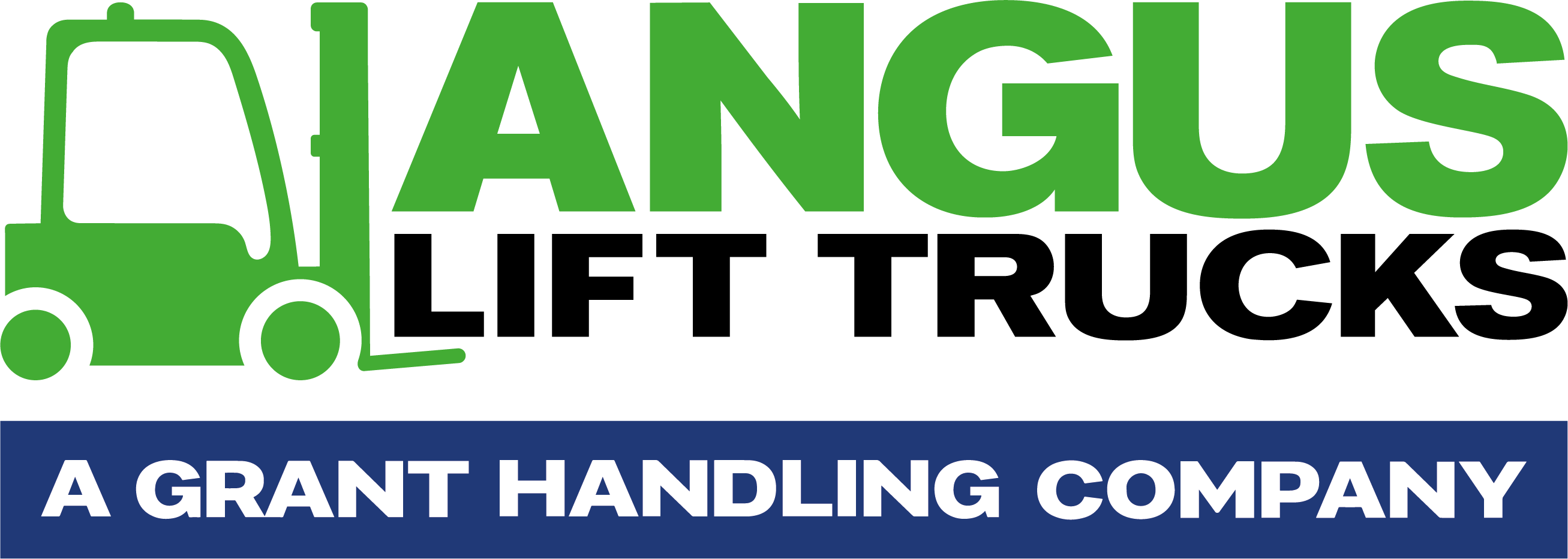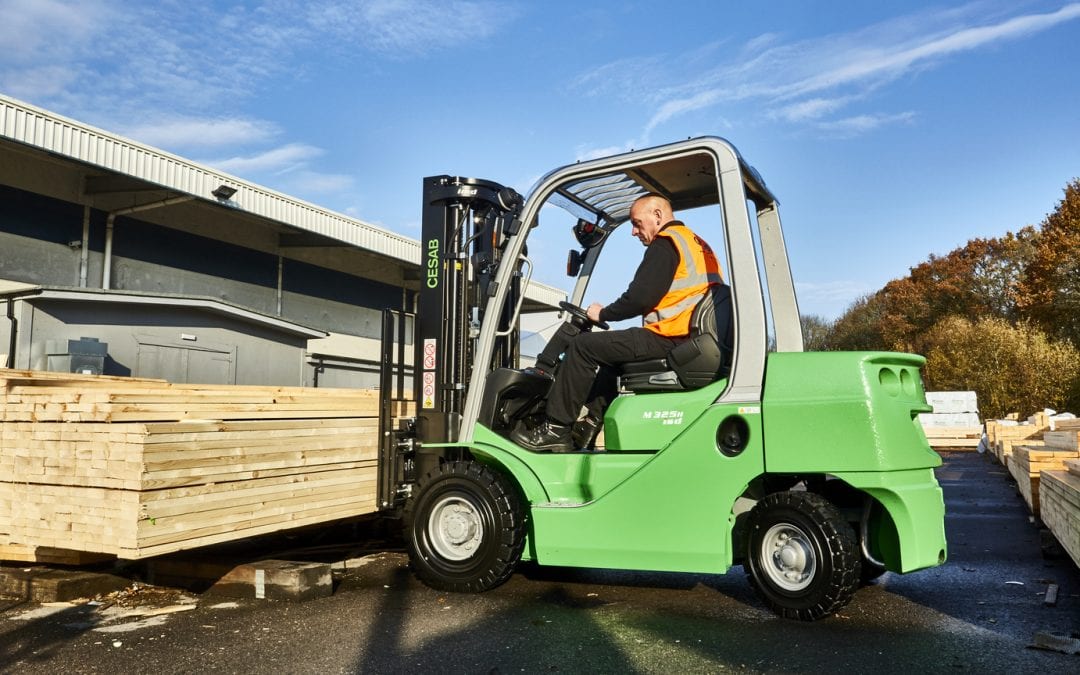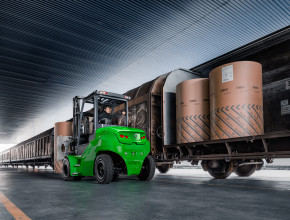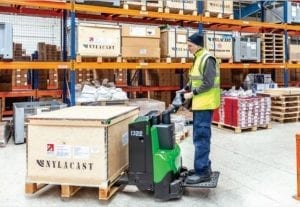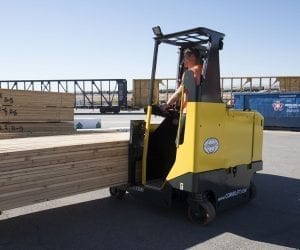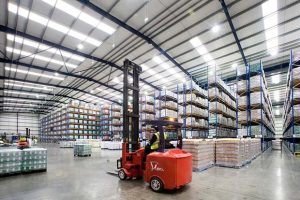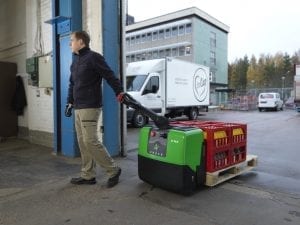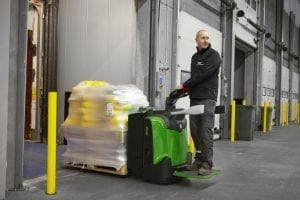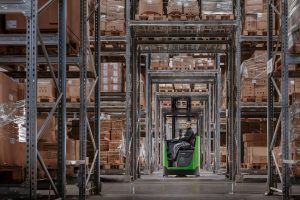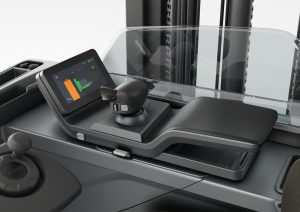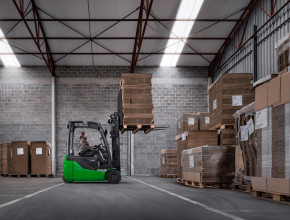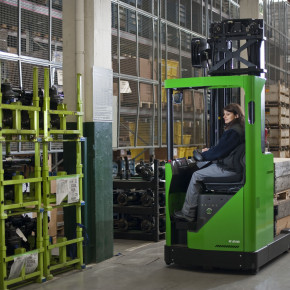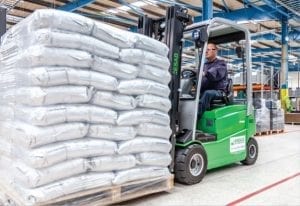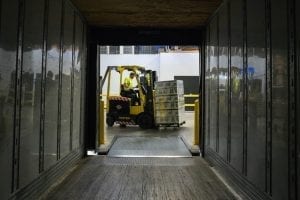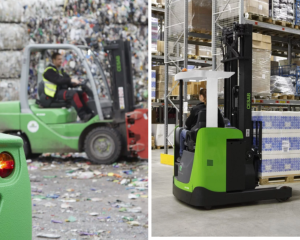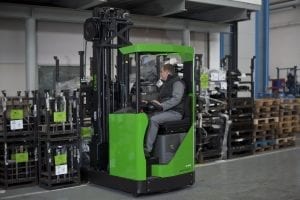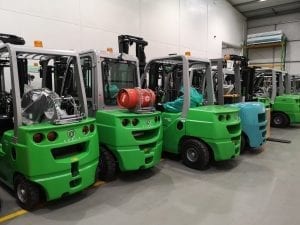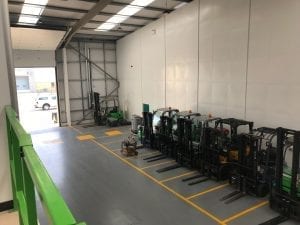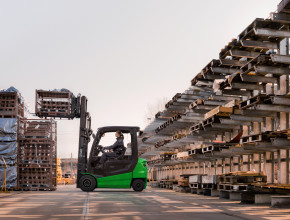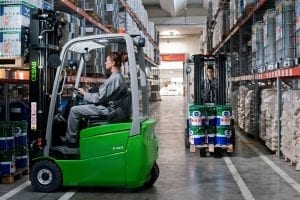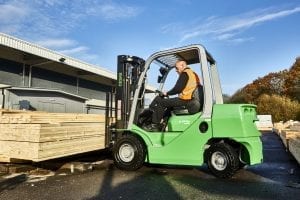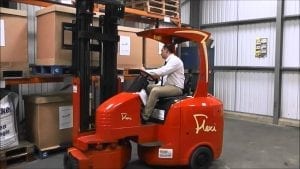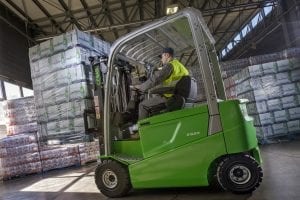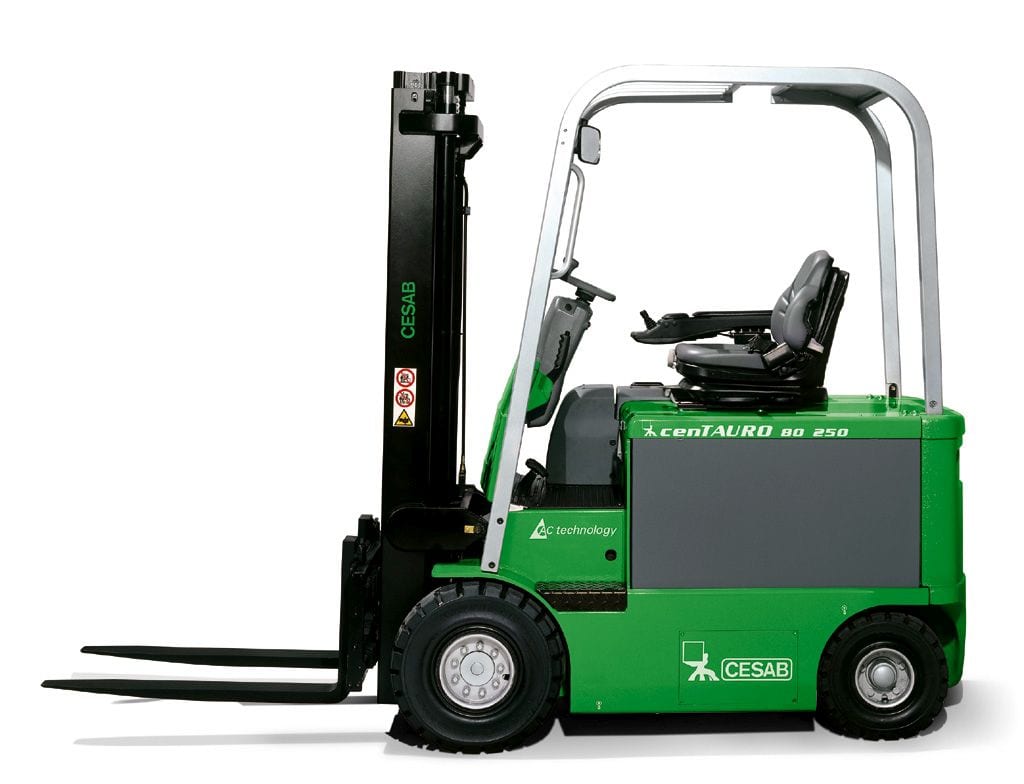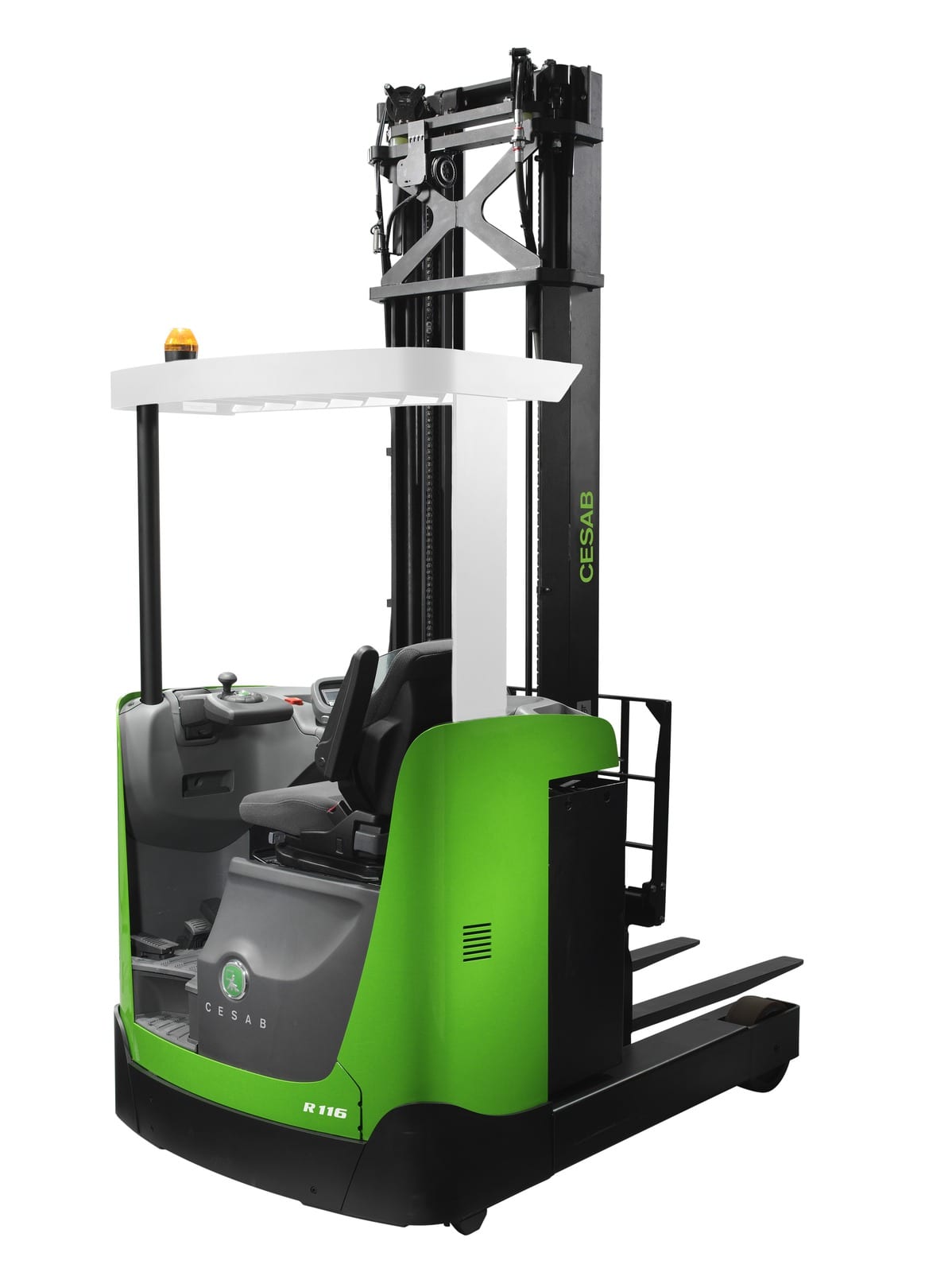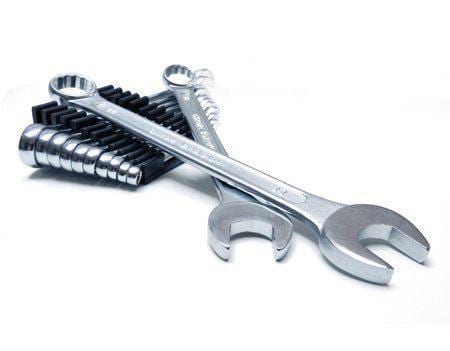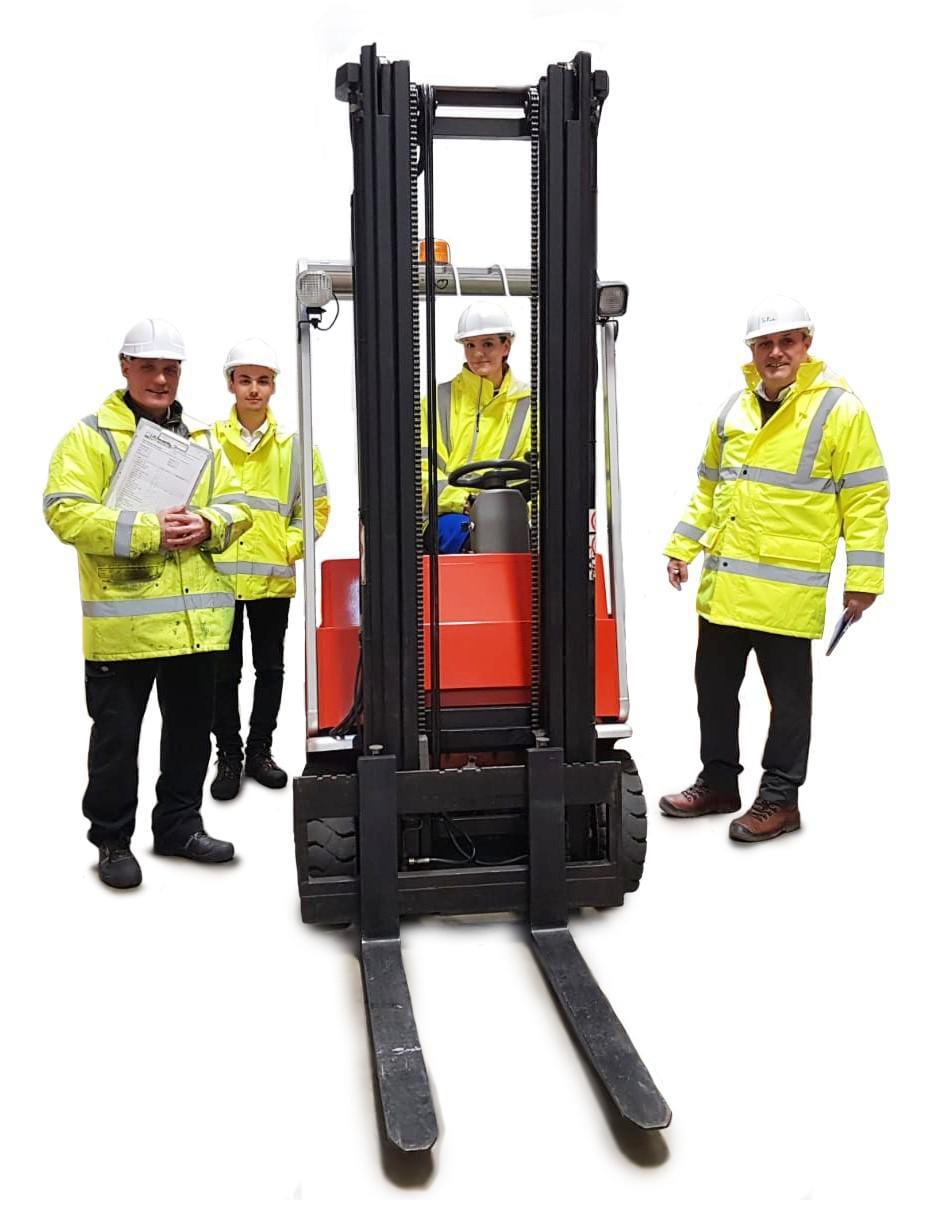Choosing whether to hire or purchase a forklift is a critical decision for any business. Except for your employees, heavy equipment like forklifts is likely to be one of your greatest expenses. If you’re looking to reduce your material handling costs, it will be critical that you choose the right arrangement for your heavy equipment.
Fortunately, businesses have the option to purchase, lease, or rent forklifts depending on their needs. But, how can you be sure that the arrangement you’ve chosen is the ideal one for your business? Today, we’ll cover everything you need to know about the pros and cons of hiring or purchasing a forklift.
Start by listening to our podcast episode on the most important stuff you need to be aware of when making a fork truck rent vs. purchase decision:
Short-Term Forklift Hire
For many businesses, a short-term hire arrangement makes the most sense for their needs. Renting allows a business to address its short-term needs with a relatively cost-effective solution. Any maintenance and service costs are also built into the price of the equipment. Once the project is complete, the rental is returned, and no additional costs are incurred.
Short-term hires are also ideal for special cases. For example, you need equipment at a remote job site for several weeks. Or, you’re auditing operations within your warehouse, and you need new equipment to experiment with different picking methods. Whatever the case, short-term hire is a low-risk way to acquire the equipment you need.
Renting is also an excellent way to access the capabilities and service of an equipment provider. With a short-term rental, you can see how a dealer responds to service and repair needs before deciding if you’d like to purchase or lease equipment from them.
Perhaps the largest reason why companies opt for short-term forklift hire is seasonality. Many businesses experience a significant seasonal rush, where they must rapidly ramp up operations. Once the rush has passed, the short-term rental equipment is returned, which eliminates ongoing rental and storage costs while providing additional flexibility for your company.
Downsides of Short-Term Hire
There are a few drawbacks you’ll need to contend with when opting for short-term hire, and they might be large enough for you to consider alternatives.
The first drawback is cost. Short-term rentals are the most expensive of the three arrangements. A business offering forklifts for hire has a fleet of equipment at any time, most of it is sitting idle, awaiting hire. The high cost of a rental helps pay for the expenses of the unhired machines. Maintenance costs are also built into the price when you hire a lift, further raising the bottom line.
Another area of concern is the quality of equipment you’re receiving. Renters don’t exercise the same care with a rental as a machine they own or lease, so it’s common for a rented machine to be riddled with dents, dings, and quirks that you wouldn’t have with a long term hire, or purchase.
Long-Term Forklift Hire
Long-term hire or leasing is fast becoming the most popular way to obtain fork trucks and other equipment.
Leasing equipment has many tangible benefits, including lower upfront costs, flexibility, and constantly updated equipment.
Compared to purchasing a forklift outright, leasing requires a smaller initial investment. The initial cost is lower, but you’ll be receiving the same brand new equipment. Having new equipment also allows you to operate more efficiently than you would be with an ageing forklift, and you’re guaranteed a new fork truck each time you renew your lease.
At the end of your lease, you also have complete flexibility. If you love the machine, you could choose to purchase it outright. Otherwise, return it for a newer model, or switch to something altogether different.
Many dealers also allow you to build a maintenance package into your monthly payment, so you can more accurately track the total cost of the equipment without having to account for unforeseen circumstances.
Downsides to Long-Term Hire
Long-term hire does have some negatives that may make an outright purchase a better fit for your business.
The most obvious downside is that you don’t own your asset, you’re merely paying a substantial fee to use it. Most leasing agents also impose usage limits on their equipment, similar to the mileage restrictions if you lease a vehicle. If you put more hours on the forklift than your leasing agreement allows, there may be significant costs. The last issue can be a negative or a positive, depending on the company. When you lease a fork truck, you’re also putting your faith in the leasing agent to efficiently and properly provide service and repair when necessary. If the company is slow to make repairs or perform maintenance, it can result in costly downtime.
Finally, if you would like to get more information about the rental options available to you, do get in touch with our team. We are a leading provider of forklift hire services in Leicestershire, Nottinghamshire, Birmingham, Northamptonshire, Warwickshire, Derbyshire, West Midlands & East Midlands.
Buying a Forklift
Buying a forklift does present some advantages you can only realise through purchasing equipment.
Businesses with lots of capital on hand or access to inexpensive lines of credit may find that purchasing a forklift makes the most sense for them. When you purchase one outright, you’re able to add that asset to your books. You can also borrow against your forklift for other purchases, or sell it to finance new equipment in the future.
Over the lifetime of the fork truck, buying the machine outright will prove to be the least costly arrangement of the three. You can also buy a second-hand lift truck, which further reduces your investment costs.
Downsides of Buying a Forklift
Purchasing a machine outright does have some drawbacks.
For one, purchasing a forklift represents the highest upfront cost of any arrangement. Depending on the model you choose, a forklift can easily cost upwards of £30,000. Purchasing a forklift also eliminates the flexibility that comes with short or long-term hire arrangements.
Deciding to buy a forklift is a big decision for any business. Indeed, aside from the cost of employees, an asset like a forklift could be one of your more significant outgoings.
Thankfully, there are a lot of great options available to accommodate the diverse sectors that require the use of forklift trucks.
When you want to equip your workplace with a new forklift, you’ve got three primary choices. You can:
- Buy a new forklift.
- Hire a forklift.
- Buy a used forklift.
Figuring out what is best for your business requires careful consideration. Each option has its own pros and cons, which we will discuss in detail below. Of course, if you are looking to purchase reliable LOLER-compliant forklifts in the UK, do get in touch with our teams in Leicestershire, Northamptonshire, Birmingham, Warwickshire, Nottinghamshire, Derbyshire, East Midlands, or West Midlands
So, let’s explore whether you should purchase second-hand forklifts, new forklifts, or hire one instead.
Buying a new forklift
Buying a new forklift comes with some big plus points. These machines have the latest tech, advanced safety features, and excellent energy efficiency. Additionally, because they’re new, you get comprehensive warranties that protect businesses against the cost of repair and maintenance.
Overall, buying a new forklift is recommended for companies that use forklifts intensively in their operations.
Let’s take a look at the advantages and disadvantages of buying a new forklift.
Pros and cons of buying a new forklift
Pros
- Reliability: You can expect a new forklift to run well for years with limited downtime.
- Performance: New forklifts come fitted with the latest technology and features, ensuring top performance.
- Warranty and support: When you buy a new machine, you’re covered under warranty for 12 months or far longer in the case of extended warranties.
- Customisation: Businesses with unique needs can customise their forklifts via manufacturers or suppliers.
- Tax advantages: You can write the cost of a new forklift off your annual taxes.
- Energy efficiency: Each new generation of forklifts becomes more energy efficient, which helps businesses cut operating costs.
- Regulatory compliance: New models are built to meet current safety and environmental regulations, reducing the risk of non-compliance penalties.
- Job satisfaction: Advances in ergonomics mean forklift trucks have improved comfort and safety features, which can boost employee happiness and satisfaction.
Looking to Buy or Hire
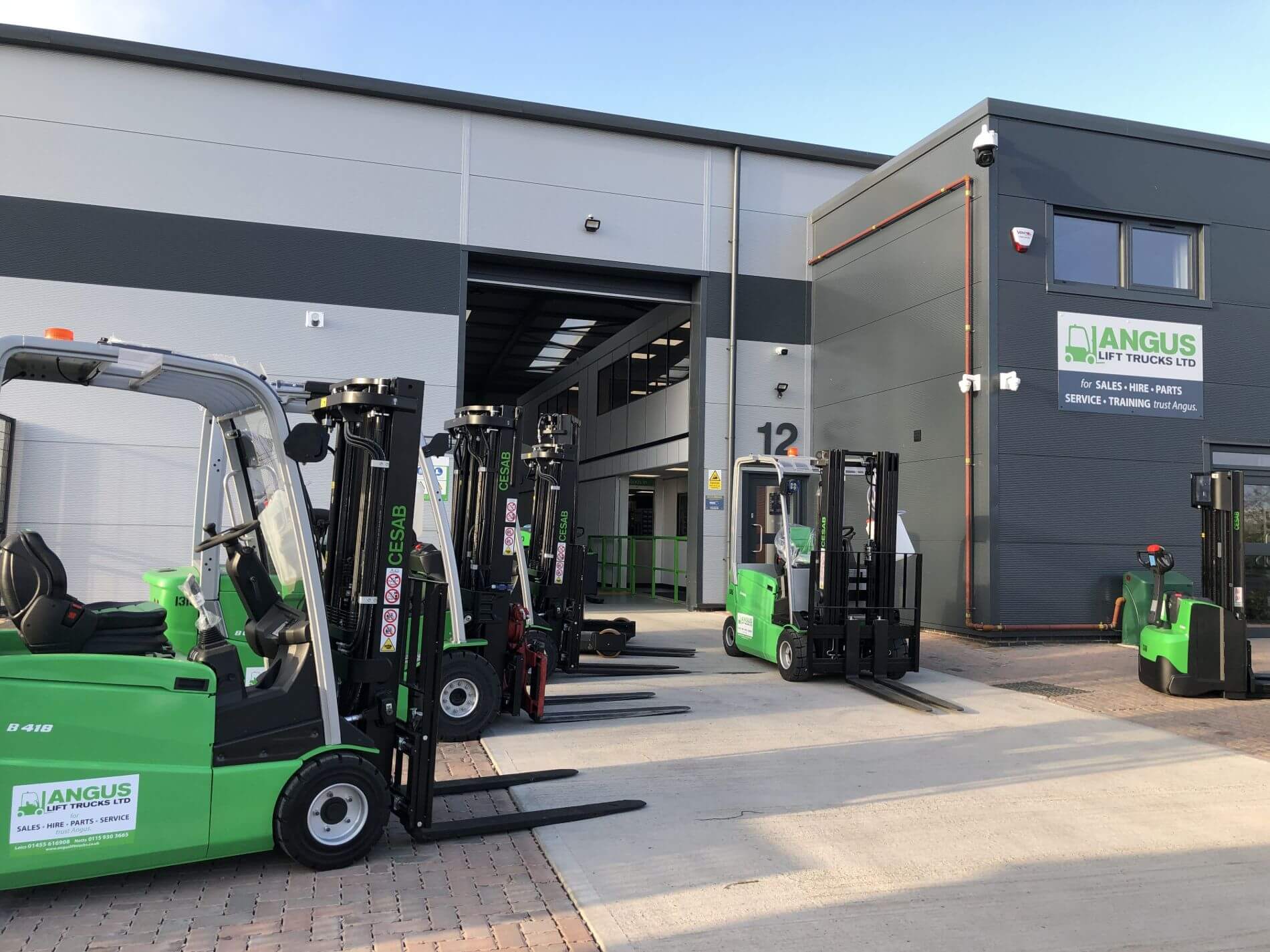
a forklift?
With 35+ years of experience, we offer our most competitive rates, flexible finance, 4h service promise & more!
Cons of purchasing a new lift truck
- High upfront costs: Buying a new forklift involves significant upfront costs.
- Lead times: Some new forklifts come with long lead times, often up to weeks or months.
- Depreciation: New forklifts depreciate quickly and essentially lose value from the moment of purchase.
- Insurance: A new, expensive forklift can result in higher insurance premiums.
Renting a forklift
For many businesses, it makes more sense to hire a forklift. These cost-effective and flexible arrangements help mitigate against fluctuating demands while also allowing teams to get their hands on the latest tech without a large upfront investment. What’s more, hiring a forklift helps you cut out the cost of maintenance or repair parts, which can make a difference to the bottom line.
Hiring is particularly suitable for short-term projects, seasonal work, or for companies who want to test different forklift models before making a purchase decision.
Pros and cons of renting a forklift
Pros of hiring a forklift
- Lower upfront costs: Renting a forklift does not involve large initial costs.
- Technology: If you rent a forklift, you have access to the latest technology and features.
- Scale: Renting a forklift truck gives businesses the flexibility to scale assets around their schedules.
- Maintenance: Most rental agreements cover routine maintenance and repairs, which significantly reduces the burden on the business.
- Storage: If not in use, rental forklifts can be returned, eliminating the need for storage space and associated costs
- Try before you buy: Hiring a forklift gives you a chance to test out new models and find the one that works for your business.
Cons of renting a lift truck
- Long-term costs: Hiring a forklift truck for extended periods can actually work out more expensive than buying either new or used.
- Limited customisation possibilities: Typically, rented forklifts don’t come with the same customisation options that can fit around unique workflows.
- Equity: Buying a new or used forklift helps your business build equity. This is not possible when you hire a machine.
- Seasonal availability: During peak seasons, there might be limited availability of rental forklifts, potentially disrupting operations.
- Hidden costs: Some rental agreements may have hidden fees for overtime use or specific operational conditions
Buying a secondhand forklift
There are lots of good reasons to purchase second-hand forklifts. Perhaps the most compelling argument is that you can get your hands on a quality model at a far lower price than buying a new one. Additionally, if you do your due diligence and get a well-serviced machine, a second-hand forklift can produce value for your business for many years.
Used forklifts are ideal for businesses with light to moderate usage, which is typically defined as less than 15 hours per week.
Pros and cons of buying a secondhand forklift
Pros
- Low initial costs: Secondhand forklifts can be as little as half the price of an equivalent new model.
- Slower depreciation: Once the first couple of years of depreciation are complete, forklifts tend to hold some value, allowing businesses to recoup some of their investment if they decide to sell.
- Immediate availability: Unlike new models that may require waiting periods for delivery, used forklifts can often be obtained relatively quickly.
- Sustainability: Buying a secondhand forklift can align with your company’s sustainability goals.
Cons
- Reliability issues: If you don’t work with a trusted reseller or vet the forklift properly before purchase, you might inherit another business’s problems.
- Warranty: While warranties on used forklifts are available, they are typically short and offer limited coverage.
- Dated technology: Most second-hand forklifts don’t have the latest technology and features, which could lead to productivity issues for your business.
- Limited selection: While the UK market for secondhand forklifts is good, there is no guarantee that the model you want will be available at short notice.
How does depreciation work when you buy a
new forklift vs buy a secondhand forklift?
When evaluating the relative merits of buying a used vs new forklift, there are a number of factors you need to consider. Chief among them is the depreciation rate of your assets.
Put simply, forklifts are a lot like cars. The moment they’re put into use, they start to lose value. Accountancy experts suggest the annual depreciation rate for a forklift is as much as 15% to 25%.Let’s run a simple example to see how purchasing a new forklift compares with a secondhand machine through the prism of depreciation.
New forklift
You buy a new forklift. It costs £10,000, and the model typically depreciates at around 25% per annum.
Here’s how things will look over the course of the next four years.
| Year | Value at Year-End | Depreciation |
| 0 | £10,000 | |
| 1 | £7,500 | £2,500 |
| 2 | £5,625 | £1,875 |
| 3 | £4,219 | £1,406 |
| 4 | £3,164 | £1,055 |
Total depreciation of four years: £6,835.94
Residual value: £3,164.06
Cost per year: £1708
Second-Hand forklift
You buy a used forklift truck. It once retailed for £10,000, but now that it’s a couple of years old, you can purchase it for £5,000. This secondhand forklift also has a 25% depreciation rate.
| Year | Value at Year-End | Depreciation |
| 0 | £5,000 | |
| 1 | £3,750 | £1,250 |
| 2 | £2,813 | £938 |
| 3 | £2,109 | £703 |
| 4 | £1,582 | £527 |
Total depreciation of four years: £3417.97
Residual value: £1582.03
Cost per year: £854
The two tables show the financial differences when you buy used forklift trucks vs new forklift trucks. Buying used does lead to a lower cost per year, but as an older machine, it’s more likely to have mechanical problems or performance issues when compared to a brand-new model. So ensure you factor in the total cost of ownership before you make any decisions.
Looking to Buy or Hire

a forklift?
With 35+ years of experience, we offer our most competitive rates, flexible finance, 4h service promise & more!
Buying new vs buying secondhand vs renting: A comparison
Deciding whether buying new, used, or rent your forklift involves weighing up lots of different factors. This handy comparison table will help you decide the best path forward.
| Factor | Buying New | Buying Second Hand | Renting |
| Initial Cost | Highest | Lower than new | Lowest upfront cost |
| Long-term Cost | It can be cost-effective for long-term use | Potentially lower than new, but higher maintenance costs | Highest for extended use |
| Availability | May have wait times for delivery | Usually immediately available | Typically quick availability |
| Customisation | Fully customisable to specific needs | Limited customisation options | Limited customisation options |
| Warranty | Full manufacturer’s warranty | Limited or no warranty | Maintenance usually included |
| Latest Technology | Access to the newest features and technology | May lack the latest innovations | Access to newer models, but may vary |
| Maintenance Responsibility | Owner’s responsibility | Owner’s responsibility | Usually handled by the rental company |
| Lead times | Could be weeks or months. | Quick. | Quick. |
| Tax Benefits | Potential for depreciation write-offs | Potential for depreciation write-offs | Rental fees may be tax-deductible |
| Resale Value | Highest depreciation initially but retains some value | Lower resale value | No resale value (not applicable) |
When is buying new vs buying second-hand
versus renting a forklift the right decision?
Now that we’ve laid out the pros and cons and financial arguments, it’s time to get down to further practicalities. Each business is different and has its own unique goals and objectives.
Here are some different scenarios that show how buying a new or used forklift compares to hiring.
Buy a New Forklift
- High-Volume Warehouses: Large distribution centres or eCommerce fulfilment warehouses that operate 24/7 with heavy usage are excellent candidates for buying new forklifts. New equipment can handle intensive use, has the latest safety and ergonomic features, and maximises uptime.
- Specialised Industries: Companies in the manufacturing or construction sectors often require special attachments or unique mast configurations. Buying a new forklift offers a greater degree of customisation, which can suit these companies and their particular requirements.
- Tech-driven teams: Any business with a commitment to optimising operational efficiency through new technology might prefer the benefits of a new forklift. For example, many of these modern machines come with telematics systems for fleet management and performance tracking, which will suit teams using Big Data to get an edge.
- Scaleups: Businesses with aggressive growth plans that anticipate increased material handling needs over the next few years can unlock the benefits of buying a new forklift. Investing in tools that support growth while ensuring equipment longevity is a smart move.
- Sustainable businesses: If your business is trying to reduce its carbon footprint and meet sustainability goals, a new energy-efficient electric forklift could be the answer.
Hire a Forklift
- Seasonal businesses: Many businesses experience huge fluctuations in demand over the course of a year. For example, retailers during the lead-up to Christmas, agricultural businesses during harvest time, holiday resorts, and so on. When demand is up and down, hiring a forklift for the months that it’s required makes financial sense.
- Project-based work: Construction firms or event management businesses often work on short-term projects or contracts. Hiring a forklift suits these needs because the team doesn’t have to commit to long-term ownership or storage of a material-handling machine.
- Startups: New or small companies with limited capital often prefer hiring forklifts. This ensures they remain financially flexible and don’t drain cash flow during the early stages of growth.
- Expanding businesses: If your business is expanding into new markets or exploring the viability of new product lines, they may benefit from initially renting a forklift until the results of these ventures are clear.
- Cost-conscious business: Sideloaders are one of the more expensive types of forklift trucks. Depending on a business’s circumstances, it might need one of these machines infrequently. In this case, buying a forklift and augmenting it with a rental can prove cost-effective while still allowing for operational flexibility.
Buy a Used Forklift
- Light usage operations: As we mentioned above, heavy use is typically defined as four or more hours a day. For small warehouses or retail backrooms with light use requirements, a well-maintained second-hand forklift should be more than adequate for their operations while making sense financially.
- Teams on a budget: Running a business is tough right now. A used forklift can provide an elegant solution for teams that are on a tight budget but still have consistent material handling requirements.
- Supplementary equipment: Companies that already own forklifts can bolster their fleet with a used truck to handle peak periods in a cost-effective manner.
- New contracts: Teams that experience an unexpected surge in business might find themselves hamstrung by long lead times on new forklifts. Buying a second-hand truck can help them add capacity while they await their brand-new machine.
- Business continuity: A second-hand forklift truck can provide valuable backup when other machines are being repaired. Reducing the impact of downtime requires a mix of planning and creative strategies, and a used forklift is a cost-effective option.
Final thoughts
At Angus Lift Trucks, we know that choosing between owning or leasing a forklift is a personal decision, and the correct answer will depend on the unique needs of your business.
There’s something to be said about owning these assets. Still, many large companies are choosing to forgo that leverage for the flexibility and ease of for hire equipment.
As you decide on the best arrangement for your warehouse, consider your current needs, and how you expect them to change over the next twenty years. Meet with the stakeholders on your team to get their input, and choose the arrangement that will deliver maximum value for your company.
This post is also available in:
Français
Deutsch
Italiano
Português
Español
Български
Hrvatski
Eesti
Latviešu
Lietuvių
Polski
Português
Русский
Slovenčina
Slovenščina
Türkçe
Українська
Albanian
Čeština
Dansk
Nederlands
Ελληνικά
Magyar
Română
